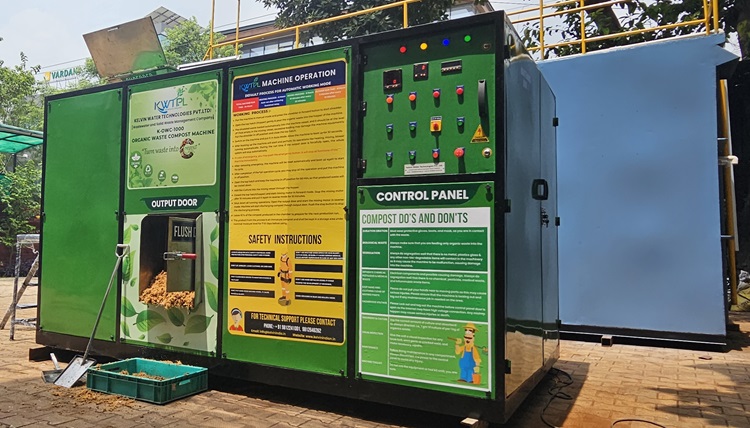What Is a Food Waste Composter and How Does It Work?

In today’s world, where sustainability and environmental responsibility are more crucial than ever, the proper disposal of food waste has become a significant concern. With millions of tons of food being wasted globally each year, efficient solutions like Food Waste Composters are gaining popularity. These machines offer an eco-friendly way to manage organic waste by converting it into nutrient-rich compost. One of the leading names in this space is Kelvin Water Technologies Pvt. Ltd., a reputed manufacturer listed on the Government e-Marketplace (GeM) portal, providing reliable food waste management solutions for homes, commercial kitchens, institutions, and industries.
What Is a Food Waste Composter?
A Food Waste Composter is a machine or system designed to convert organic food waste into compost through a biological process known as aerobic decomposition. It accelerates the natural composting process by providing the ideal environment for microorganisms to break down organic material efficiently. Unlike traditional composting, which can take weeks or even months, food waste composters significantly reduce the time required, often producing compost within 24–48 hours.
These machines can handle various types of food waste, including:
- Vegetable and fruit peels
- Cooked and uncooked food
- Dairy products
- Bread and grains
- Meat and bones (in advanced models)
How Does a Food Waste Composter Work?
The basic working mechanism of a food waste composter involves several key stages:
1. Feeding the Waste: Food waste is first loaded into the composter through a top or front-loading door. It may be pre-sorted to remove non-compostable items like plastic or metal.
2. Grinding/Shredding : Some composters include a built-in shredder that breaks the waste into smaller pieces, increasing the surface area for microbes to act on and speeding up the decomposition process.
3. Decomposition: The core process involves aerobic digestion, where oxygen, heat, moisture, and microbial activity work together to break down organic matter. The temperature is maintained between 50°C to 60°C to support thermophilic bacteria, which rapidly digest the food waste.
4. Mixing and Aeration: Internal mixers or agitators turn the waste regularly, ensuring even decomposition and preventing the formation of anaerobic pockets (which can cause foul odour).
5. Moisture Control: The system maintains the correct moisture balance. If the waste is too dry, it won’t decompose efficiently. If too wet, it could create odour problems. Advanced machines include moisture sensors for automatic regulation.
6. Heating: Many commercial-grade food waste composters come with heaters to maintain an optimal temperature for decomposition, especially useful in colder climates.
7. Curing: Once the compost is formed, it may need a short curing phase (a few hours to a few days) to stabilize the organic material before it is ready to be used as soil enhancer.
Types of Food Waste Composter
There are different types of food waste composters based on their design, capacity, and operation:
| Type | Description |
| Manual Composters | Suitable for home use, require manual mixing |
| Electric Composters | Fast and automatic, suitable for households and small commercial setups |
| In-vessel Composters | Fully enclosed systems, ideal for large-scale food waste management |
| Bio-digesters | Use anaerobic digestion to convert waste into biogas and compost |
| Industrial Composters | High-capacity machines for hotels, malls, canteens, and food processing units |
Benefits of Using a Food Waste Composter
- Reduces Landfill Burden: Diverts significant amounts of food waste from landfills.
- Minimizes Methane Emissions: Prevents harmful methane gas generation.
- Produces Valuable Compost: Enriches soil and reduces the need for chemical fertilizers.
- Reduces Waste Management Costs: Especially beneficial for businesses and institutions.
- Promotes Sustainability: Encourages responsible waste management practices.
- Odor-Free Operation: Modern composters are equipped with odor control systems.
- Hygienic: Reduces the risk of pests and health hazards associated with rotting waste.
Why Choose Kelvin Water Technologies?
Kelvin Water Technologies Pvt. Ltd. is a pioneer in the field of waste management, known for offering high-performance Food Waste Composters that cater to domestic, commercial, and industrial requirements. The company is:
- GeM Registered: Listed on the Government e-Marketplace (GeM), making it easier for government institutions, PSUs, and public departments to procure reliable composting solutions.
- ISO Certified: Ensuring quality and safety standards in product manufacturing.
- Customized Solutions: Provides tailored solutions as per client needs and waste generation volume.
- Nationwide Presence: Offers installation, training, and after-sales support across India.
- Sustainable Technology: Uses energy-efficient and eco-friendly technologies to reduce carbon footprint.
Applications of Food Waste Composter
- Residential Societies
- Restaurants and Hotels
- Cafeterias and Canteens
- Airports and Railways
- Hospitals and Educational Institutions
- Municipal Corporations
- Food Processing Industries
Compliance with Government Guidelines
With the Government of India promoting the Swachh Bharat Abhiyan, zero-waste campuses, and sustainable urban development, food waste composters are now part of waste segregation mandates across many states. Kelvin Water Technologies ensures:
- Compliance with Solid Waste Management Rules, 2016
- Support for Green Building Certifications
- Integration with Smart City Projects
Conclusion
A Food Waste Composter is a smart, sustainable, and economical solution to tackle the growing problem of organic waste. It not only helps in reducing environmental pollution but also transforms waste into a valuable resource—compost. For those seeking a reliable and proven solution, Kelvin Water Technologies Pvt. Ltd. stands out with its GeM-approved composters that combine innovation, durability, and efficiency.
Whether you’re a homeowner looking for a compact unit or an institution seeking large-scale waste management systems, investing in a food waste composter is a step toward a greener future.
Convert kitchen waste into Compost – 100% Natural Compost | K-OWC Composter Machine
Contact Us At
| [w |